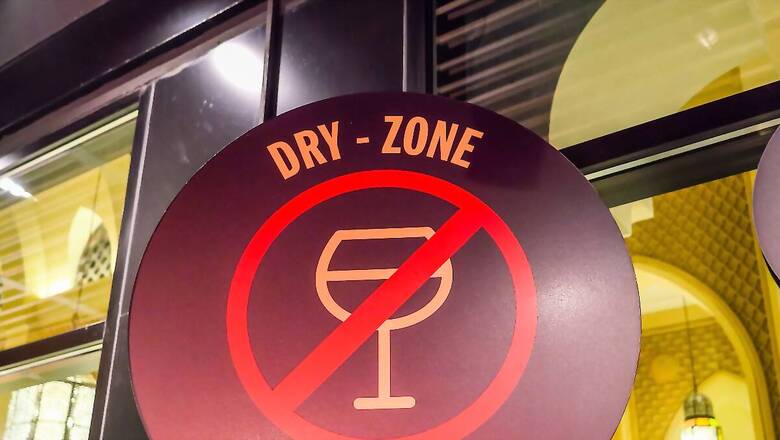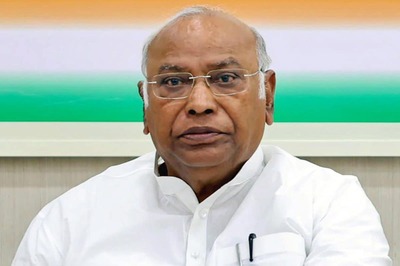
views
January 22, the consecration day of the Ram Mandir in Ayodhya, may very well be a dry day for some BJP-ruled states, including Uttar Pradesh. The grand event, with the invitee list headlined by Prime Minister Narendra Modi, will see the Ram Lalla (child form of Lord Ram) idol installed in the sanctum sanctorum of the Ram Temple, ceremony known as ‘Pran Pratishtha’.
Celebrations have been planned across India, with the PM urging people to light diyas to mark the historic moment and the BJP organising specials pujas in temples and localities. To preserve the sanctity of the occasion, governments of several BJP-ruled states have prohibited the sale of liquor on January 22, Monday.
Chhattisgarh
The first state to ban the sale of alcohol on January 22 was Chhattisgarh, where the BJP swept to power last month. Chief Minister Vishnu Dev Sai announced his decision last week. “The state government has decided that January 22 will be a dry day in the entire state,” he said.
This essentially means that not only will the sale of liquor be banned over the counter in retail shops, but also in pubs, restaurants, and high-end clubs.
The CM had added that the state’s Rice Millers’ Association has sent 300 metric tonnes of fragrant rice to Ayodhya for the celebrations and farmers from the state will also send vegetables to Uttar Pradesh.
Assam
Chhattisgarh’s example was soon followed by Assam. The state’s tourism minister Jayant Malla Barua announced: “To commemorate the inauguration of the Ram Temple, the Assam government has decided to declare January 22 as a dry day.” The BJP is currently in its second consecutive term in the north-eastern state.
Uttar Pradesh
The centre of action on January 22, Uttar Pradesh, too, came out with dry day orders as Chief Minister Yogi Adityanath directed that there will be no sale of liquor in the state on the day of ‘Pran Pratishtha’. He said the day will be celebrated like a “national festival”. January 22 will also be a holiday for all educational institutions in the state.
Yogi Adityanath had asked for orders on the ban of liquor sale to be issued during his visit to Ayodhya on January 9.
Additionally, he called for the implementation of the ‘Kumbh Model’ of cleanliness in Ayodhya. “There should be no dust or filth on major roads or streets like Dharma Path, Janmabhoomi Path, Bhakti Path, Ram Path. Currently, more than 3,800 sanitation workers are deployed, and the number of employees should be increased by 1,500.”
Last year, the state government had declared the entire 84-Kosi Parikrama, an area near the temple premises, as a ‘no liquor zone’. Sale and consumption of liquor is banned and wine shops would be either shifted or removed from the area, state excise minister Nitin Agrawal had said then.
Heritage Area of Jaipur Municipality
While Rajasthan, also ruled by the BJP since election results last month, hasn’t come up with any overarching ban, it has been decided that meat shops in Jaipur’s Municipal Corporation (JMC) Heritage area will remain closed on January 22. While demands for the closure of liquor shops within JMC’s limits were also made by BJP leader Gopal Sharma, Mayor Munesh Gujjar turned it down on technical grounds. Areas like Amer, Hawa Mahal, Civil Lines, Kishanpole, and Adarsh Nagar fall under JMC limits.
Maharashtra
While Maharashtra is ruled by a coalition government, the BJP is a key component of the alliance with the Eknath Shinde faction of the Shiv Sena and the Ajit Pawar faction of the NCP. The Eknath Shinde government, however, hasn’t enforced any dry day rule, possibly considering Mumbai’s cosmopolitan nature and the huge revenue it garners.
But that hasn’t stopped BJP leaders from making demands for liquor and meat ban on January 22. Writing to the CM, BJP legislator Ram Kadam requested a temporary restriction on the sale of liquor and meat in the entire state. “On January 22, there is a consecration ceremony in Ayodhya. It is the most auspicious and holy day. I, therefore, request you to ban liquor and meat on that day.” Kadam, in fact, requested “the central government to implement it in the entire country”.
While the demand wasn’t given much attention by the coalition leaders, the opposition ended up a digging itself into a ditch. Jitendra Awhad, who belongs to the Sharad Pawar-led NCP faction, kicked up a row saying Lord Ram was non-vegetarian. “He used to hunt and eat. He is ours, of bahujans. You are turning us into vegetarians, (but) we are following the example of Ram and consuming mutton,” Awhad said at an NCP conclave at Shirdi. He apologised for the statement after multiple police complaints were registered against him.




















Comments
0 comment